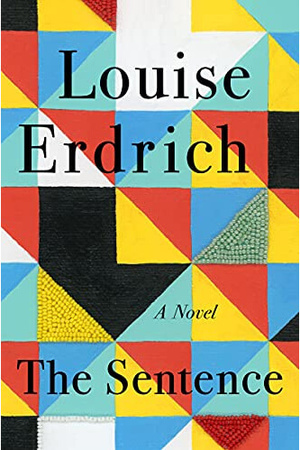A good novel is a feat of alchemy. The book itself is just paper and ink, words captured in print. Words — spoken, sung, written, texted — surround us constantly and for the most part evaporate into the past. But in a good novel, the author chooses and arranges the words in such a way as to conjure entire landscapes, cultures, conflicts, families and personalities. In a great novel, even the most attentive reader can’t quite understand how the author explains so much more than what happens in the story.

Louise Erdrich has that gift. In The Sentence, Erdrich’s 18th novel since her 1984 debut, Love Medicine, she’s reached new heights of wizardry. On the surface, this is a story about a Native American woman who works at a bookshop in Minneapolis in 2020. Tookie has a tremendous sense of humor, a keen, intuitive sense of literature and an enviably happy marriage. The problem is that the ghost of a wannabe Indian is haunting her at the bookshop.
Or so the plot goes. But Tookie’s real problem is that she’s a Native American woman living in Minneapolis in 2020. Yes, she’s got the same problems finding food in the grocery stores we all had. Like so many people, she’s worried she’ll lose her job because she expects her employer will go out of business during the lockdown. And she and her husband worry about getting COVID just like everyone else.
But unlike many of us, Tookie lives in a community that has a deeply unhappy relationship with the powers that be. Her husband belongs to a volunteer group that spends Saturday nights trying to protect other Native Americans from police brutality in the city where George Floyd was murdered. Tookie didn’t witness that event, but she lives through the explosions that rock Minneapolis in every sense.
Tookie expels the ghost from the bookshop, but I’m still haunted by The Sentence. Months before it was published, I visited the Museum of Ojibwa Culture in St. Ignace, Michigan. It unsettled me to learn that residential schools were still operating here in Michigan when I was happily attending my own (all-white as far as I can remember) elementary school. I didn’t know and, in fact, I could not imagine what life is like for Native Americans until I read Louise Erdrich.
Somehow, without being didactic or preaching a lesson or issuing a manifesto, Erdrich lays bare the systemic injustices in America. How does she have me laughing out loud even as I’m cringing with outrage? It’s the magic of a great novelist, a storyteller who can sum up a time and place in a seemingly simple tale.
Megan Koreman lives in Royal Oak, Michigan. She is a historian and author of The Expectation of Justice: France, 1944-1946 and The Escape Line: How the Ordinary Heroes of Dutch-Paris Resisted the Nazi Occupation of Western Europe. A young adult novel, Dark Clouds over Paris is forthcoming. Read more at dutchparisblog.com.